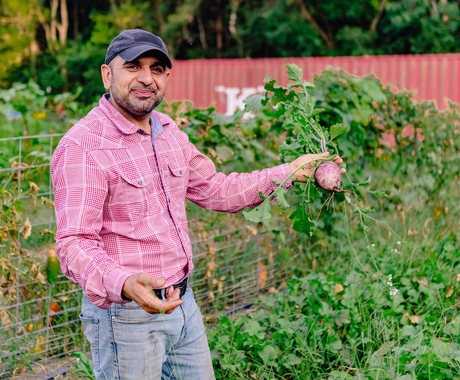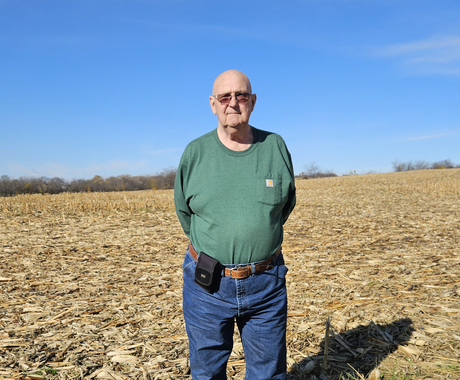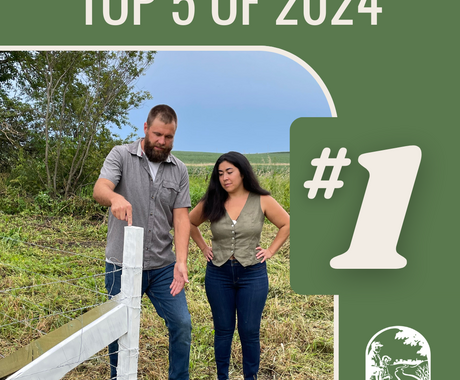Patricia Pinto has had a number of setbacks—from hail to high temperatures to a derecho. But she’s not giving up on the farm she purchased in 2019.
“Sometimes it’s hard to start a business,” Patricia said. “They usually tell you the first three years are the hardest ones, so I’m praying and hoping, and asking God for mercy that this year I am going to have my best crop ever.”
Her farming dream started when she was 12 years old. She then studied agriculture and completed a Master’s degree in plant genetics. And, she was working in molecular biology in a commercial lab in Honduras before arriving in the U.S., where she didn’t do much agriculture.
“I almost totally forgot that I really wanted to farm,” Patricia said.
Then, 40 years after first having that farming dream, Patricia’s sister Martha Pinto found an abandoned farm for sale just north of Omaha. The buildings were run-down and the soil wasn’t healthy, but Patricia had plans.
“I wanted to be able to sustain myself and my family and have an excess to sell so I can live from the farm income,” she said. “I’m into sustainability, regeneration, soil field depth, and, I’ll call it, all-type farming. You know, like in the old, old days when you have chickens, pigs, vegetables, and commercial crops.”
Another big factor was making the farm diversified. That comes with beekeeping and a pollinator garden that produces flowers to sell at markets, as well as food for bees.
“I believe that bees are the secret of agriculture,” she said.
Patricia also raises chickens. She has tried to plant vegetables but hasn’t had a lot of luck.
The first year’s yield wasn’t great. Then she installed a high tunnel that was destroyed by wind, and everything inside died. The next setback was a pipe bursting. This season, 98% of her seedlings were destroyed because of early high temperatures.
But the barn is still standing, even though a derecho damaged the north wall and it needs to be repaired. Some of those seedlings survived, including tomatoes and zucchinis. She has been attending local farmers markets selling ornamental, interior plants.
And, Patricia found the Center for Rural Affairs to help her along the way. This spring, she applied for and was accepted into the Center’s Beginning Farmer Conservation Fellowship Program. She is one of seven who received individual mentorship from an experienced farmer, plus classroom instruction, $2,000 in funding, and assistance from the Center and its partners.
“I got the fellowship, and now I feel like I’m on the right track,” Patricia said. “Through the Center, I’ve been able to meet other organizations and people. I also got in touch with the Department of Agriculture and that’s also been a great help. So, I have been blessed in that sense of other people assisting me through this journey, because it’s a journey.”
Her mentors are Dave and Deb Welsch, who farm near Milford, Nebraska. Dave also serves on the Center’s Advisory Committee.
“Dave and Deb visited and were able to see what I envisioned,” Patricia said. “That was validation.”
Farming is hard because there are many things to juggle, she said, and no one can control factors like the weather.
“Dave gave me great perspective and also great advice and I’m very happy that I met him,” she said. “I now have somebody that I can talk to, and he relates to my struggle.”
As a part of the fellowship, Patricia is creating plans to improve the soil, remove invasive species, and create a bigger pollinator garden.
Despite the hardships, Patricia sees the bright side.
“It’s just the satisfaction at the end of the day that you accomplished something,” she said. “And, right now it’s so relaxing and fun to see the chickens. They have different personalities within the flock—it’s interesting.”
Patricia also notes the survival of the plants after being hit by high winds, hail, and high temperatures.
“You still see fruits on their plants. That for me is a very rewarding experience, even though monetarily I cannot see it,” Patricia said. “But, God is good. No complaints.”
Congrats fellows
Congratulations to our very first group of Conservation Fellows: Kelsey Jones, Peter David, Tricey Sullivan, Kelly Alsup, Mariel Barreras, Jazz Marr, Katie Bettin, and Claudia Patricia Pinto.
The Conservation Fellowship is a new program at the Center for Rural Affairs funded by the Natural Resources Conservation Services. These fellows will complete coursework in conservation programs and practices, climate change adaptation and impacts, racial equity, and leadership.
Fellows will design and implement a conservation project on their own farm, and present at the annual Nebraska Sustainable Agriculture Conference on their project and findings.
Feature photo: Patricia Pinto was accepted into the Center’s Beginning Farmer Conservation Fellowship Program where she receives individual mentorship from an experienced farmer, plus classroom instruction, $2,000 in funding, and assistance from the Center and its partners. | Photos by Justin Carter
Additional photos: Patricia Pinto purchased an abandoned farmstead just outside of Omaha, Nebraska, where she is improving soil health and focusing on sustainability and conservation.




